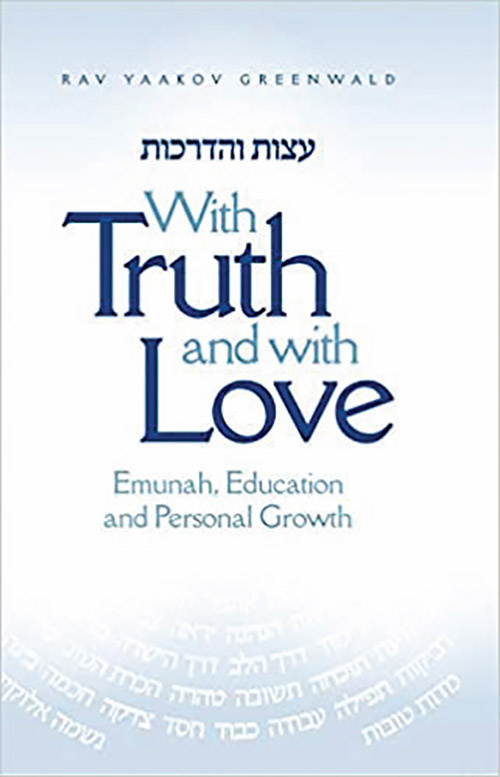



With four days of Yom Tov and Shabbat Chol Hamoed, no walks to shul—or outside, for that matter, Pesach was a time for learning and reading. And these four books were of particular note.
Rabbi Dr. Yaakov Greenwald was a psychologist, and close to luminaries of the previous generation such as the Steipler Gaon, the Kopyczynitzer Rebbe, Rav Yehuda Zev Segal, Rav Shraga Feivel Mendelowitz and Rav Yaakov Kamenetsky. Besides for their greatness, all of these rabbis were unique in their understanding of the human mind and character. They truly understood the human condition, which made them so sought after.
An English translation of his “Eitzos V’hadrachos,” in “With Truth and With Love: Emunah, Education and Personal Growth” (Feldheim Publishers), he captures much of their spirit in the understanding of the human mind. The book is focused on practical aspects of education and personal growth.
As a scholar and psychologist, Greenwald was able to capture these fundamental strategies about life and Judaism and details them in a practical and pragmatic manner. The advice and guidance in the book are both timeless and timely.
“Pathways to the Heart: Opening the Teachings of the House of Izhbitz,” by Reuven Boshnack. Kodesh Press, 2020. Paperback. 323 pages. English. ISBN-13: 978-1947857360.
Mention Izhbitz and many people will know about the Mei Hashiloach, and that it was a controversial work by Rabbi Mordechai Yosef Leiner, the first rebbe of Izhbitz. More than that, they likely do not know. Moreover, that is a shame given the brilliance that emanated from the house of Izhbitz.
In “Pathways to the Heart: Opening the Teachings of the House of Izhbitz” (Kodesh Press), Rabbi Reuven Boshnack has captured numerous insights from the house of Izhbitz. He culls some of the more penetrating insights from the first five rebbes of Izhbitz and ties them into the weekly parsha.
The insights here are both profound and subtle. Each chapter closes with practical advice, and what the message is in the Izhbitzer tradition. Boshnack is a student of Rabbi Moshe Weinberger, who also quotes often from Izhbitz, and you can almost hear his voice in the pages of this most insightful work.
Bible critics try to use events from the early prophets to further their notion that the Torah post-dated the early prophets. Their logic is that the transgressions committed by characters would seem to indicate that the Torah was not yet given at that time. Their view is, how else could these characters have made such fundamental mistakes?
Written initially as Rabbi Allen Schwartz’s master’s thesis in 1985, “Conflict & Resolution in the Early Prophets” (Kodesh Press) lists over 100 violations of Torah law the in books of Joshua, Judges and Samuel that on the surface, would ostensibly indicate that the characters were unaware of the Torah laws. The Bible critics make their point that the laws were not given at the point.
Schwartz writes that these difficulties are not new, and were already known during the times of the Talmud, where they were dealt with. Many of the rishonim, who he quotes in-depth, also dealt with these issues.
Schwartz lists over 40 different types of Torah violations from over 100 different episodes. A cursory reading of the early prophets would make all of these characters seem quite guilty of these indiscretions. But careful and astute scholar that he is, Schwartz shows the real story, and how in most of them, they were dutifully aware of the Torah violations, which in many cases were not in fact violations.
He writes that usually, the rabbis of the Talmud try to justify any act of a biblical figure who is considered righteous. Occasionally, however, the rabbis resolve an unnoticed violation with the answer that the person did wrong, even if the person is considered righteous.
Schwartz has done a superb job of detailing these seeming infractions, and also creating a classification with six different types of outcomes to these stories.
In “The Importance of the Community Rabbi: Leading with Compassionate Halachah” (Urim Publications), Rabbi Dr. Daniel Sperber has written an extraordinarily well-researched book where he tries to demonstrate the need for contemporary Halachic authorities to rethink their methods of issuing Halachic rulings.
Rabbi Hershel Schachter was once giving a shiur, and the lectern was placed such that many people could not see him. He was asked to move it, to which he replied: “You see, everything is moving to the right.”
Sperber rightly notes that the contemporary trend in Halachic rulings has been toward greater stringency and exaggerated conservatism. His exhaustive research and sources here are truly impressive, and this makes for a superb source guide on the topic.
Sperber makes many legitimate points in the book, but is far too polarizing a figure for his message to be heard for the audience he is trying to convince. This is due to his involvement in an annulment of marriage for an aguna in a private rabbinical court, giving semicha to women, trying to permit kitniyos for everyone and other things that make the charedi public apoplectic.
The Rambam wrote that “One must accept the truth from whatever source it comes.” For those that can do that and separate some of Sperber’s more controversial views and actions, this is a fascinating read, where he attempts to create a kinder, gentler Halachic approach, without any compromise to the Halacha itself.
Ben Rothke lives in New Jersey and works in the information security field. He reviews books on religion, technology and science. @benrothke�











